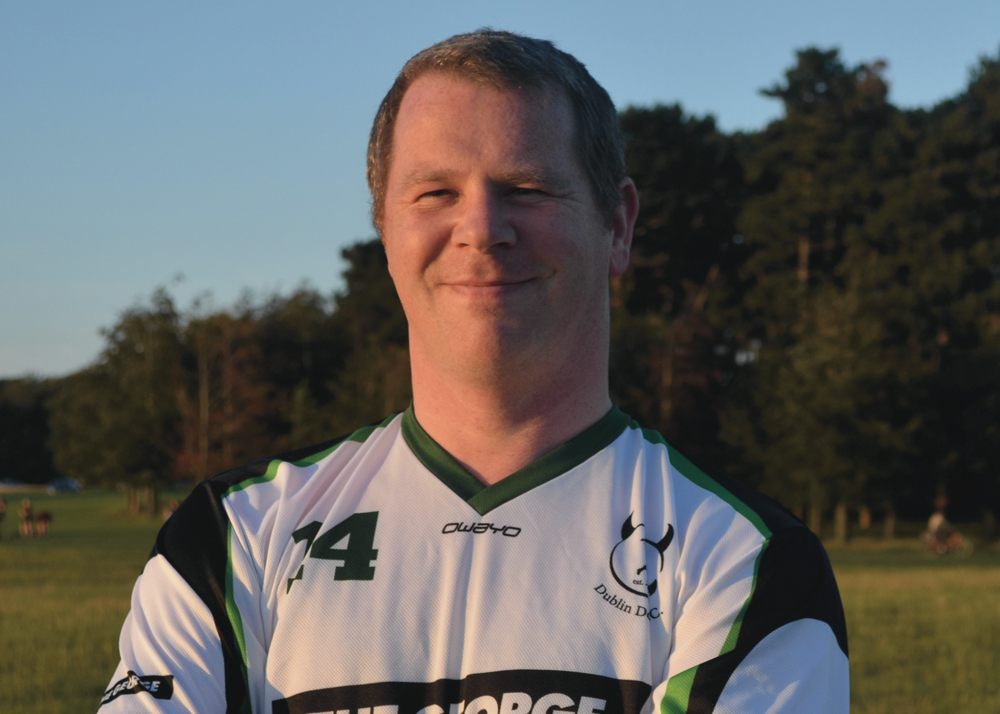Jack Leahy | Senior Editor
“Being gay is a topic that is ‘ignored’ in football and not a ‘serious topic in the changing room’.”
When former Germany and Aston Villa midfielder Thomas Hitzlsperger came out as gay in January, he can’t have been referring to Dublin Devils FC, a team for whom LGBT issues have been integral in the inception of the club and beyond.
I was welcomed to the club’s Tuesday training session last week and spoke with some of the club’s longer-serving members about the club, what it means to them, and the broader issue of homosexuality in football.
FIFA President Sepp Blatter smirked and suggested that homosexuals would just have to “refrain from sexual activity” for the duration of the tournament
Founded in 2005, the club occupies a niche that grants them a greater profile than most clubs in the Leinster Senior League. The club has over 1,500 Twitter followers, and my visit is not the first media intrusion to a football session. Still, the club is modest and discreet – there is nothing to mark them out as different to the other footballing revellers in the Phoenix Park on a Tuesday evening. While this makes them difficult to find, it also ensures that club membership doesn’t necessarily out a player to passers-by.
The club, like any other, is built on social and footballing pillars. Members spoke of an outlet for competitiveness, a place to make new friends, and a refuge from dressing rooms configured not to support gay players, or potentially even alienate them. The reality remains that mainstream football, if illustrated by Venn Diagram, would show an intersection between “players” and “open homosexuality” invisible to the naked eye.
“I used to play a lot of Gaelic football, but when I came out I didn’t find a lot of options there that allowed me to feel comfortable,” said Chris, a club veteran who leads training sessions, clutching a journalist’s notebook full of tactical notes and training exercises.
“While I still could have played for my home team, I would have always been dodging questions about my sexuality or ‘where were you last night?’ or ‘who were you kissing?’. They were questions that I wasn’t comfortable answering.”
When I first came out, there wasn’t a lot going on in Dublin in terms of a ‘scene’. There were very few outlets.
“When I came to the club it was like a breath of fresh air. You could actually talk about who you were with or where you were. The atmosphere was much more open. In that sense it’s been fantastic – it’s offered me both the social and the competitive side of sport, which is really important for me. It’s important that the club can provide something for everyone.”
I asked Chris if a sporting dressing room, widely infamous as a space for a particular brand of masculinity, was a difficult place for a gay man in Ireland: “I think it’s getting better with certain people coming out – Robbie Rodgers for example. It’s easy to say that things are improving generally, but you still wouldn’t want to be the person leading the way. You’d almost want someone else to do it first. Especially where I’m from [in rural Ireland] there are still attitudes that make dressing rooms uncomfortable.”
Chris’s experiences are a sharp reminder not to romanticise the club and its context. It exists because gay men have few opportunities to participate in sports on the same terms as heterosexual players.
At the level of regulatory initiatives, football has always had a meek and casual relationship with LGBT rights. Asked in 2010 about the issue posed by holding the 2022 World Cup in anti-homosexual Qatar, FIFA President Sepp Blatter smirked and suggested that homosexuals would just have to “refrain from sexual activity” for the duration of the tournament. Germany’s World Cup-winning captain Phillip Lahm warned in 2010 that gay footballers still risk “ruining their careers” by coming out in the current context.
Club chairman and goalkeeper Bill O’Rourke has been involved with the club since its early days, and has focused his efforts on enhancing the teams competitiveness in the full format of the game while maintaining its social roots:
“When I first came out, there wasn’t a lot going on in Dublin in terms of a ‘scene’. There were very few outlets. Then, nine years later, one of the lads founded the club having been to England and seen some gay teams play – he couldn’t understand why there wasn’t one here”.
“Initially it was just kick-around stuff, with no ‘club’ to speak of, per se. It was fairly new. I went along early on, and it really opened up new avenues for meeting people from the same community as me while doing something that I really enjoy: playing football.”
“I’ve been around for pretty much the whole time. I was a player initially, then started to get involved in the organisation of the club, trying to pull it together and give it some ambition as an 11-a-side team. We want to have a club that’s open to anyone to come along and play – either socially or seriously.”
While the social side of the club remains alive, emphasised by a kickabout being held in conjunction with structured training, the club has be- come a serious prospect in recent years.
The Devils hosted gay community teams from across Europe in 2013 as organisers of the six-a-side International Gay and Lesbian Football Association ‘Euros’ competition, which the club won in 2011. They have strong links to gay teams in London, Manchester, Paris, and Berlin and entered the Leinster Senior League ladder for the first time last season. A 7-0 opening-day defeat to the reigning cup holders last weekend emphasises just how difficult a task that is.
Photo of Bill O’Rourke, chairman of the Dublin Devils, by Jack Leahy for The University Times.







